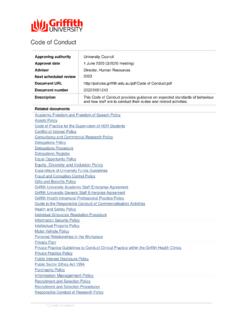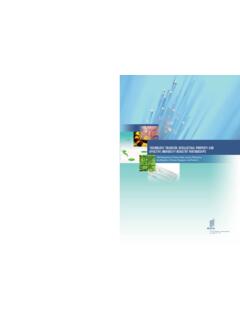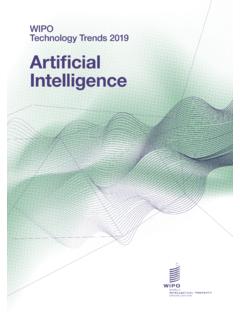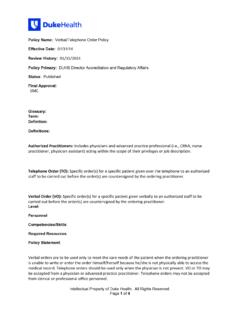Transcription of Intellectual Property Policy - University of Florida
1 Intellectual Property Policy 1. Contents A. General Comments .. 3. B. Legal Considerations .. 3. C. University Inventions and Works .. 4. Definitions .. 4. University Rights to Inventions and Works .. 6. Research Financed by Outside Sponsors and Outside Consulting Arrangements .. 8. Relationships between the Creator and the University Regarding 8. Relationships between the Creator and the University Regarding University -Supported Works .. 9. Distribution of Net Income from Works and 10. D. Procedures Regarding Inventions and University Works .. 12. Organization .. 12. Making Disclosures .. 12. Disclosure Review .. 12. Determination of University Interests .. 13. E. Relationships between Employees and the University Regarding Business Transactions.
2 13. F. Effective Date for Division of Proceeds Provisions .. 14. Appendices G. Appendix I .. 15. Section , Florida Statutes Universities; Powers; Patents, Copyrights, and Trademarks H. Appendix II .. 16. University of Florida Regulation , Works and Inventions I. Appendix III .. 19. Article 25. UFBOT/UFF Collective Bargaining Agreement- Intellectual Property J. Appendix IV .. 29. University of Florida /IFAS Policy for Program Support and Royalty Distribution from Released Cultivars K. Appendix V .. 34. Intellectual Property Agreement L. Appendix VI .. 35. University of Florida Regulation Disclosure and Regulation of Outside Activities and Financial Interests M. Appendix VII .. 37. Invention Disclosure N. Appendix VIII .. 42. Work Disclosure 2.
3 A. General Comments Central to the purpose of the University of Florida are teaching, research, and service. Research is undertaken to educate students, to stimulate a spirit of inquiry, to solve problems, and to discover new knowledge. Patentable inventions and other marketable forms of Intellectual Property may result from research conducted by personnel of the University . The University of Florida believes that a University has an obligation to serve the public interest by insuring that such Intellectual Property is appropriately developed. The University of Florida Intellectual Property Policy is meant to encourage and enable technology development and transfer for the benefit of the public. Adequate recognition of and incentive to potential inventors through sharing of financial benefits resulting from the transfer and development of patentable inventions and other marketable forms of Intellectual Property encourages the creation of such Intellectual Property .
4 At the same time, the University 's share in the financial benefits provides funds for further research at the University . In order to have successful technology transfer, a team effort on the part of the creator of the Intellectual Property , the staff of the University 's Office of Technology Licensing (OTL), the administrative staff of the creator's department and college, and others involved in the creator's research enterprise is necessary. Many factors must come together to make technology transfer successful. There must be appropriate Intellectual Property ; an effort on the part of the creator to assist in protecting and marketing the Intellectual Property ; an effort on the part of OTL to protect, market, and license the Intellectual Property ; a corporate licensee that is willing to invest the money, time, and effort to turn the Intellectual Property into a marketable product; and a market that is ready to buy the product when it has been fully developed and is ready to be sold.
5 The University 's Policy is intended to further that result. The Intellectual Property Policy , as set forth below, is a University -level document and applies to all University Personnel, as that term is defined in the Policy . B. Legal Considerations With the passage of the Bayh-Dole Amendments, Public Law 96-517, entitled The Patent and Trademark Amendments Act of l980, the federal government facilitated the retention of Intellectual Property , particularly inventions, by universities. In this act the federal government gives nonprofit organizations, including universities, the right to retain title to inventions they have made in the performance of government grants and contracts. The act reflects Congress' intention that these organizations use the patent system as a vehicle to effectuate the transfer of government-funded inventions to the public.
6 3. The Intellectual Property Policy of the University of Florida is based on Section , Fla. Stat. (Appendix I), which authorizes the University to license, protect, and otherwise deal with the work products of University personnel. The University has implemented this authority through University of Florida Regulation (Appendix II), which requires that all University of Florida personnel disclose certain works and all inventions that the person may develop or discover while affiliated with the University . Such a disclosure requirement is also found in Article 22 of the Collective Bargaining Agreement between the University of Florida Board of Trustees and the United Faculty of Florida ( UFBOT/UFF. CBA Appendix III), which governs faculty members and other employees in the collective bargaining unit.
7 Both the regulation and the collective bargaining agreement set forth the standards under which the University 's ownership of such works and inventions are determined. C. University Inventions and Works Those faculty members and other employees who are within the collective bargaining unit are governed by Article 22 of the UFBOT/UFF CBA. If there is any ambiguity or conflict between the provisions of that Article and Sections C through F of this Policy , the provisions of the Article control for those faculty and other employees in the bargaining unit. Definitions For the purposes of this Intellectual Property Policy , the following definitions shall apply: A Creator shall mean a member of University Personnel who creates a Work or Invention.
8 Cultivar Royalty Policy shall mean that Policy covering certain materials developed by certain University Personnel of the University 's Institute of Food and Agricultural Sciences/ Florida Agricultural Experiment Station who are involved in the breeding and development of cultivars, germplasm lines, or other genetic material, as defined in that Policy (Appendix IV). Development Expenses shall mean all monies paid by the University and University of Florida Research Foundation ( UFRF ) for goods and services to protect, develop, and/or enhance the marketability or any other aspect of a Work or Invention, including, but not limited to, patent filing fees, Intellectual Property protection and patent enforcement and defense expenses, marketing expenses, patent maintenance fees, consulting fees, prosecution expenses, expenses incurred in dealing with equity and other ownership interests, travel, attorneys' fees, commercialization expenses, and research costs.
9 Not included as Development Expenses are salaries and general operating expenses of University administrative personnel. 4. Gross Revenue shall mean (1) proceeds from the sale, lease, transfer, or other conveyance of an Invention or Work by the University and/or UFRF, and (2) license issue fees, option fees, running royalties, and equity or other ownership interests paid to the University and/or UFRF by a licensee of an Invention or Work, except that such equity or other ownership interests, or portion thereof, shall not be considered Gross Revenue until the equity or other ownership interests, or portion thereof, are sold by UFRF. Independent Efforts with regard to a Work means that the ideas for the Work came from the Creator, the Work was not made with the use of University Support, and the University is not held responsible for any opinions expressed in the Work.
10 Intellectual Property includes all Works and Inventions. An Invention shall include any discovery, invention, process, composition of matter, article of manufacture, know-how, design, model, technological development, biological material, strain, variety, culture of any organism, or portion, modification, translation, or extension of these items, and any mark used in connection with these items. Net Income shall mean Gross Revenues less all Development Expenses for a Work or Invention and its improvements. OTL shall mean the Office of Technology Licensing. This office is responsible for implementation of Section , Fla. Stat., concerning all matters relating to patents, trademarks, and copyrights related to identification, protection, defense, and commercialization of University -owned Works and Inventions.








